China, Tibet. It is a sacred mountain, a myth and the dream of many ambitious mountaineers. But even for non-mountaineers, a view of Mt. Everest is an absolute highlight of a trip to China. In my following article you will learn where the northern flank of Mt. Everest comes closest to you. You will also read where the highest monastery in the world is located and which highlights the trip to Rongbuk Monastery at the foot of Mount Everest offers you.
Non-solicited, unpaid advertising. This article contains affiliate links*, marked with an asterisk.
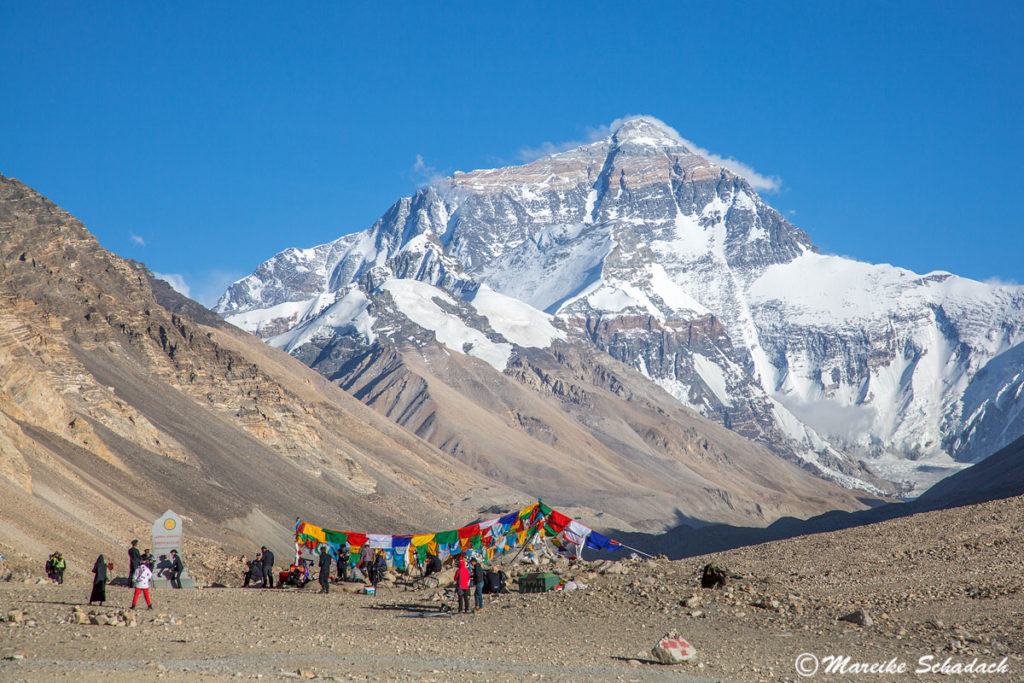
View of Mt. Everest
This far and no further. At least not for ordinary tourists like us. If you want to get ahead here, you have to be a mountaineer and have a permit. Because the narrow road leads directly to Mt. Everest Basecamp. Unlike on the Nepalese side, the mountaineers on the Chinese side can drive up to the base camp by car. This is not only easier for the mountaineers, but also for those who later transport the empty oxygen bottles etc. away.

Here, where the road for tourists ends, only a memorial stone points to the base camp. It is 5200 meters above sea level. Thus about 200 meters higher than this memorial stone. It is a popular photo motif and is photographed almost as often as Mt. Everest itself.


The memorial stone for the surveying of Mt. Everest is also a popular location for a photo shoot. Here you can find stone pyramids, saddled yaks for a souvenir photo and of course souvenirs. There are many tourists from China here who photograph each other in front of Mt. Everest with China flags.
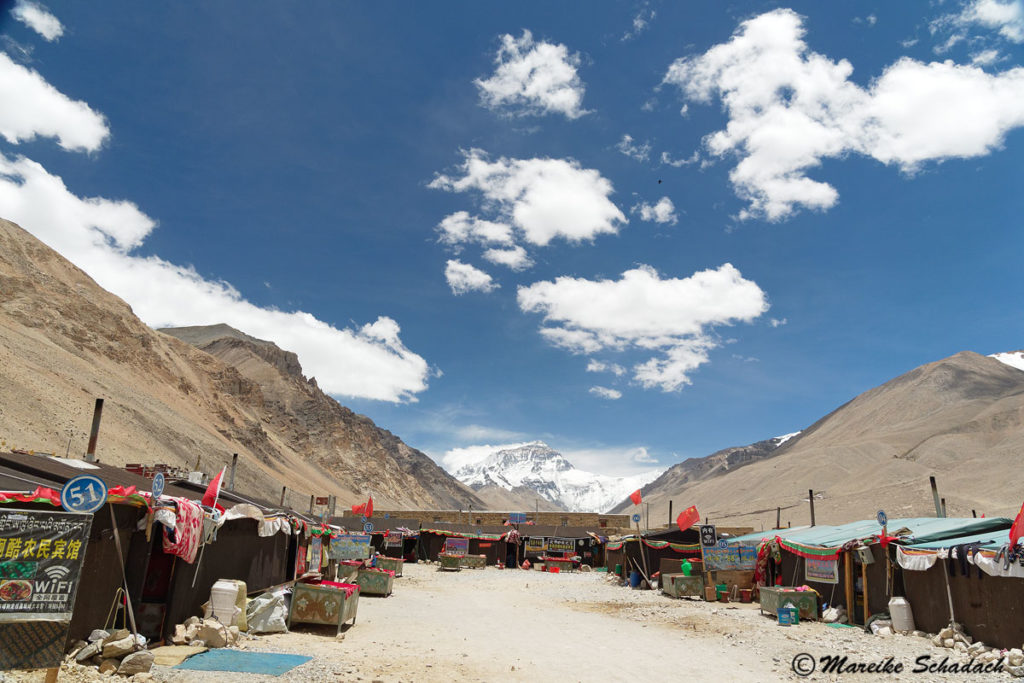
Mt. Everest (Tibetan: Chomolungma, which means goddess mother of the earth) is revered by Buddhists in Nepal and Tibet as a holy mountain. I found the sunset at Mt. Everest particularly adorable. The summit was still illuminated by orange evening light, even after the sun had disappeared behind the opposite mountains. Slowly the shadows were rising at the foot of Mt. Everest and a cold wind from the mountain came towards me.
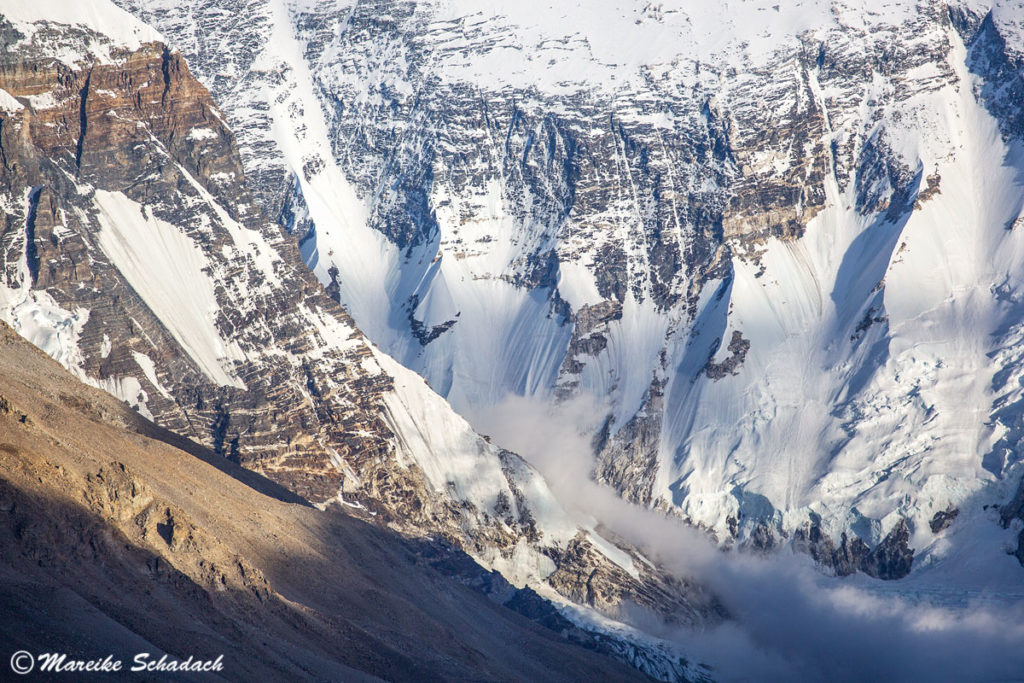

You can find the right travel backpack, mountain boots and everything else you might need on the road at Globetrotter*.

The highest Monastery in the World - Rongbuk Monastery
Up here, on the roof of the world, is the Rongbuk Monastery. With a location at 4,980 meters, it is also the highest monastery in the world and one of the highest permanently populated places in the world. Moreover, it lies in a spectacular landscape at the foot of Mt. Everest and is an absolute highlight of a trip to China. From here it is only 8 kilometres up the valley to the base camp of the northern route of Mt. Everest.

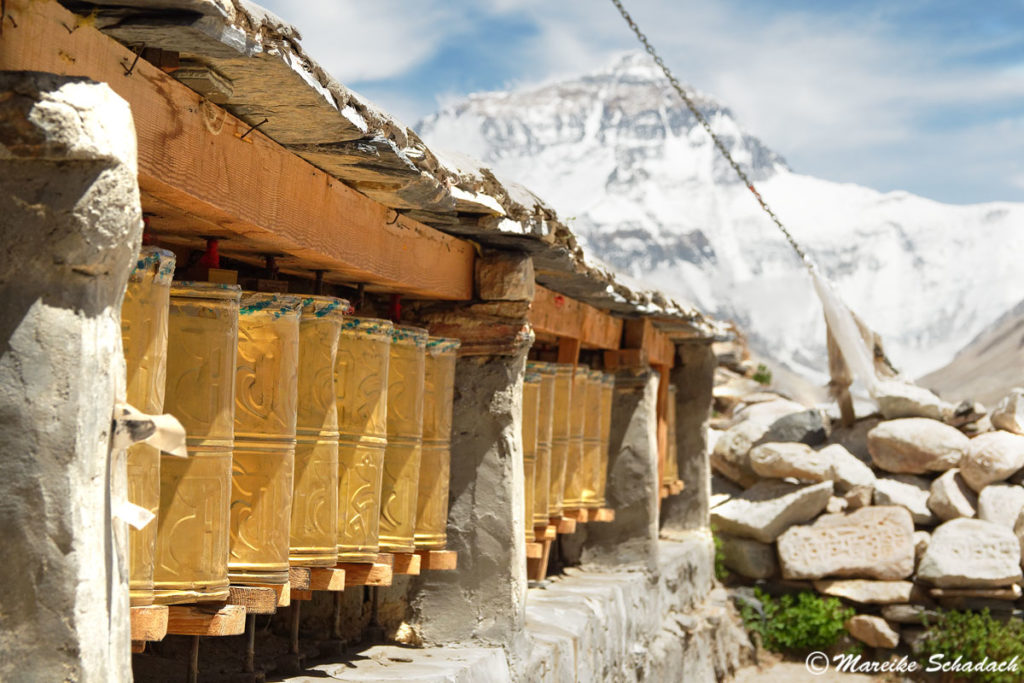
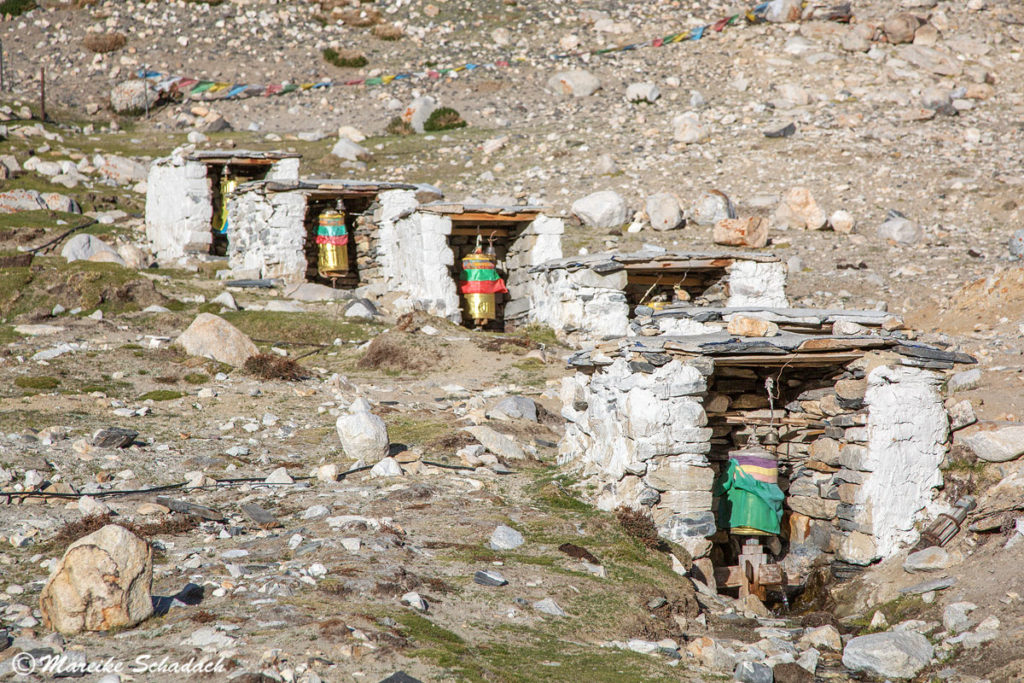

Already in the 18th century some monks and nuns settled here in simple huts and caves. The Rongbuk monastery was only founded in 1902 and is therefore a rather young monastery. According to a legend, the founder of the monastery had previously lived as a hermit in a nearby cave. The animals were his friends and the yeti provided him with food during this time. After the monastery was founded in 1902, it was initially a supply base for the hermits living higher up the mountain. During his weddings up to 500 monks and nuns are said to have laid in the monastery.

But during the Chinese Cultural Revolution the Rongbuk Monastery was completely destroyed. In 1983 the reconstruction was started. Today only 30 to 60 monks and nuns live here.
The monks gather daily from 17 o'clock in the prayer hall, have tea, tsampa and pray. Shortly before 18 o'clock they begin then with singing, bells and drums. Guests are welcome.

Photographing in Rongbuk Monastery
Fortunately, photography was also allowed inside the monastery buildings. I can also recommend the pilgrim path around the monastery. From here you have a great view of Mt. Everest and can even photograph the Stupa of the monastery with Everest in the background.
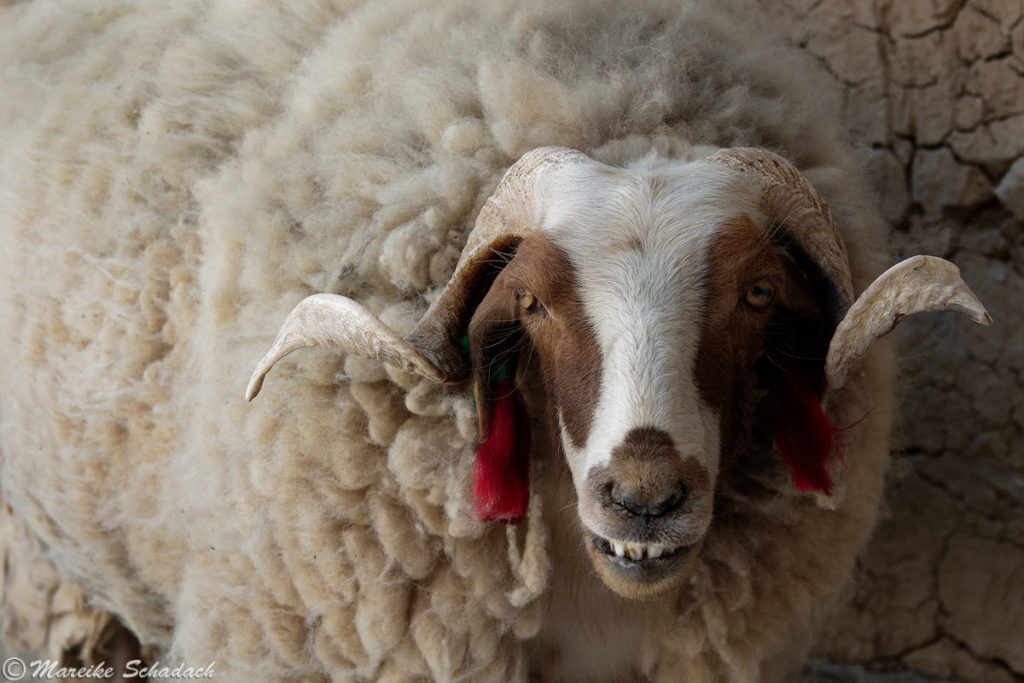

Long tested and much loved: my three companions on photo tours: the lightweight carbon tripod CT-5C I from Rollei*, the cleaning kit from Rollei*and my indestructible camera backpack, the camera backpack, the Flipside from Lowepro*.
Scenic Drive from New Tingri to Rongbuk Monastery at Mt. Everest.
The road from New Tingri to Rongbuk Monastery on Mt Everest leads through spectacular mountain scenery. Shortly after passing the checkpoint, the road winds its way up to the Pang-La Pass at an altitude of 5,150 metres. Prayer flags fluttered around us. If the altitude hasn't already done it, then the view of the surrounding mountain peaks will take your breath away. From here you can see Mt Everest (8848 m) for the first time and other snow-covered 8,000 m peaks of the Himalayas: Makalu (8485 m), Lhotse (8516 m) and Cho Oyu (8188 m). Shortly below the pass, another viewpoint offers a great view of the mountain road. Similar to an endless snake, it runs down the mountain flank. At both vantage points, nomads have spread jewellery, souvenirs and prayer flags for sale. Right here I bought my favourite bracelet with imitation black and white Dzi stones.



For the last few kilometres to our night quarters we had to change to the green Ecobus. Our accomodation was a Camplager with nomad tents on about 5,000 meters height. We all slept in two spacious nomad tents, in the middle burned an oven and warmed the water for our tea. Due to the altitude, however, it was a somewhat restless night.

Continue from Rongbuk Monastery to Saga
The trip from Rongbuk Monastery to Saga was one of the most scenic we had on our trip. Again and again we had great views to the Himalaya Mountains, especially to the 8000m Cho Oyo and Shishapangma. To the left and right of the road herds of yak grazed, we saw wild donkeys, blue sheep, black-necked cranes and geese. A few kilometres before Old Tingri we even see a Buddah face in the rocks on our right. After about two thirds of the way we reached the holy Peikutso Lake, which is a bright blue in front of the brown mountain range. It is part of the Qomolangma National Nature Reserve. On the shore salt has deposited in some places because of the dryness. Afterwards it goes downhill towards Saga on a semi-finished road. But a half-finished detour is a big challenge for our and other buses.

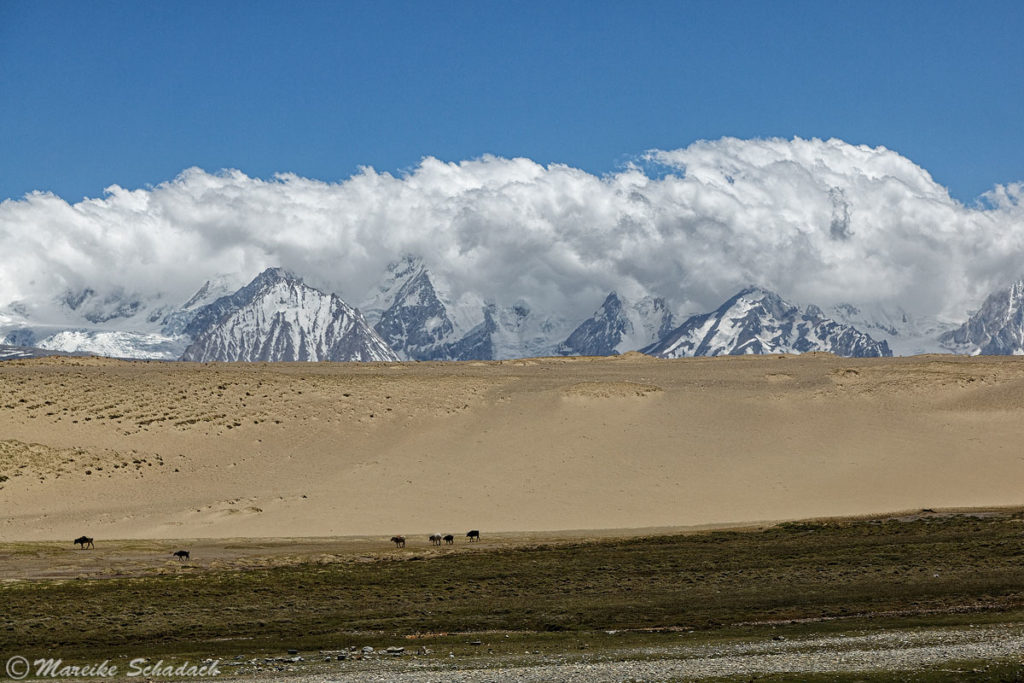


Book Recommendations for Tibet
You want to know where the journey goes? Then I can recommend these books* about Tibet.
You can order these books at Amazon with a click on the pictures. If you buy a product via one of these affiliate links, I get a small commission and you help me to keep filling Fernweh-Motive with interesting articles. The product will not be more expensive for you.
Have you ever been to Mt. Everest yourself and visited the highest monastery in the world? How did you like it? Do you have any questions about my article or suggestions? If so, please write me a comment!
Do you want to know when there are new articles on my blog? Then follow me on Facebook, Pinterest or Instagram. I would also be very happy if you share my article with your friends.
Recommendations for further Reading
Do you love road trips as much as I do? Then you might also be interested in my articles about a Climbing Mount Kenya or about a road trip through Svaneti, with the high mountains of the Georgian Caucasus.
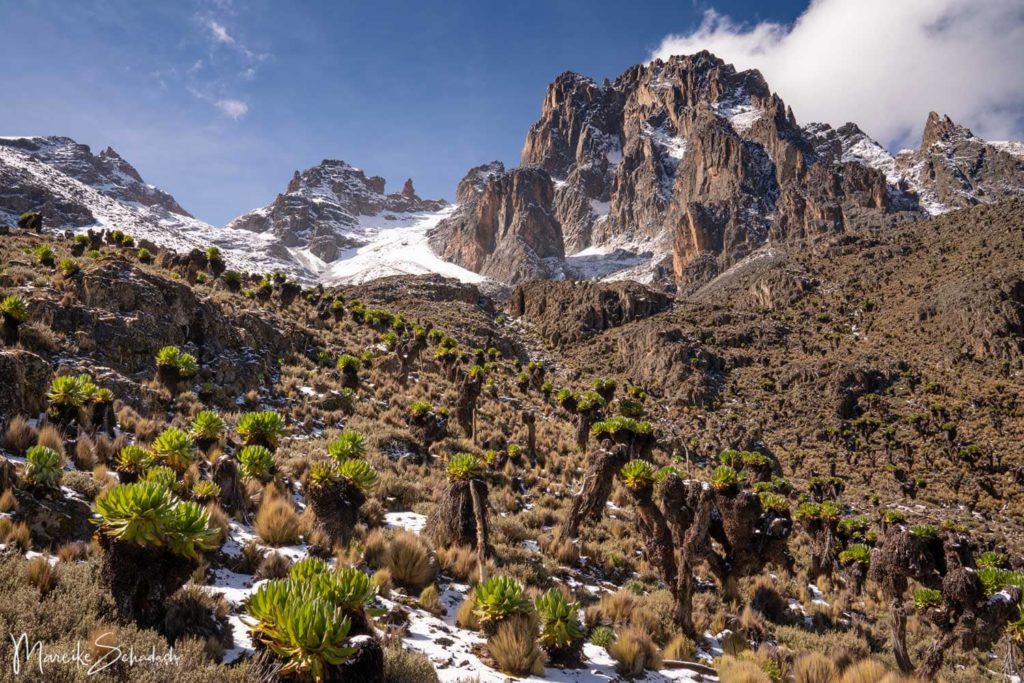
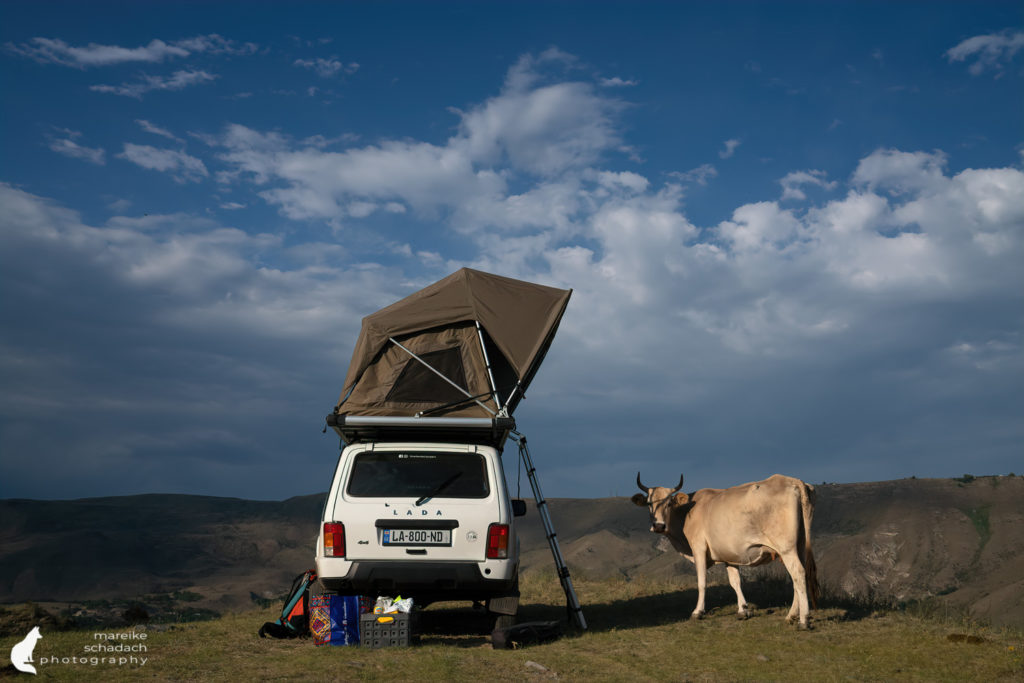







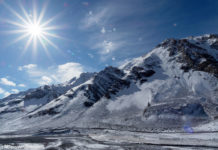
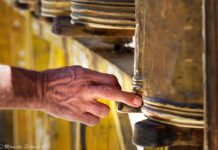
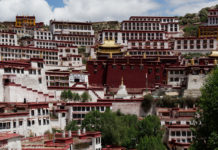
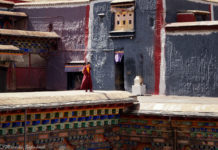
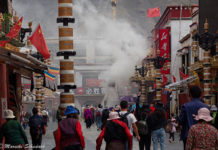
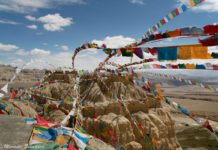
Ein sehr informativer Bericht mit schönen Fotos. Wir möchten gern nächstes Jahr eine Reise nach Tibet und Nepal unternehmen und dabei auch Rongbuk besuchen und in dem Zeltcamp übernachten. Es ist irgendwie ein Kindheitstraum von mir einmal die 8000er im Himalaya sehen zu können.
Liebe Grüße
Uwe
Hallo Uwe,
vielen Dank für Dein Kommentar und ich freu mich, dass Dir mein Artikel gefällt. Ich drücke die Daumen, dass mit Eurer geplanten Reise im nächsten Jahr alles klappt. Es ist so eine wunderschöne Gegend und es verschlägt einem wirklich den Atem, wenn man den Everest und seine fast ebenso hohen Nachbarn mit eigenen Augen sieht.
Liebe Grüße, Mareike
Hallo Mareike,
ich habe gerade deine Website entdeckt und werde mir morgen alle Tibet-Artikel durchlesen. Schon in zwei Wochen geht es für mich nach Tibet und ich befinde mich in der letzten Recherche zu dieser Reise.
Ich bedanke mich schon einmal für deine tollen Artikel und die Informationen, die du mit uns teilst.
Hej, vielen Dank für dein Feedback. Dann wünsche ich dir schon mal eine gute Reise! Schöne Grüße, Mareike
Danke dir, ich bin sehr gespannt. Besonders natürlich auf die Höhe. Zwar war ich schon einmal in Chile auf solch einer Höhe unterwegs. Jedoch waren wir dort deutlich kürzer auf dieser Höhe unterwegs.